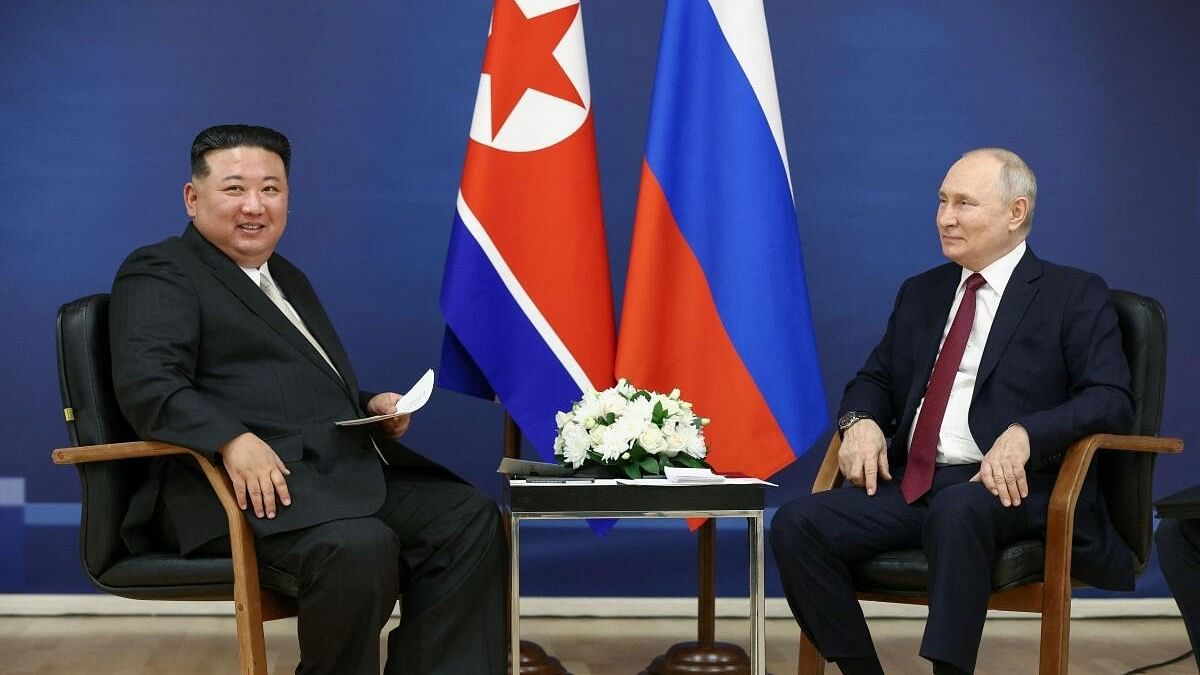
Russia's President Vladimir Putin (right) and North Korea's leader Kim Jong Un (left).
Credit: Reuters File Photo.
By Gearoid Reidy
When it comes to North Korea, western interest tends to wax and wane: from the Barack Obama-era approach of tactical patience to the Donald Trump bombast of summits, fire and fury.
These days, the spotlight is elsewhere. With the devastation in Ukraine and the war between Israel and Hamas absorbing most of the political oxygen in the US, Pyongyang seems of so little concern to the average American that it no longer even figures on the list the country’s biggest enemies.
In an annual Gallup poll asking respondents who is America’s greatest foe, just 4 per cent answered North Korea this year, down from 51 per cent in 2018, and behind even the US itself. Despite jitters after Pyongyang’s outright rejection of reunification earlier this year, the administration of President Joe Biden remains far more focused on Beijing than Pyongyang, and the missile launches that once caused terror across global markets now elicit snoozes.
That might be one reason North Korea has resorted to floating excrement-laden balloons over the border, evidently in response to activist groups in the south sending packages with leaflets and other information. Although the metaphor-heavy sight of the two Koreas trading manure and K-pop music over the border makes for good headlines, it’s not likely to turn the global gaze back onto the very real risks that exist on the peninsula.
But for a better view of why North Korea shouldn’t be ignored, look at a larger package that will be crossing over the North Korean border. Russian President Vladimir Putin is visiting the country Tuesday and Wednesday, his first such sojourn in 24 years. Following Kim Jong Un’s trip to Russia last September, it comes as ties between the two strongmen are growing increasingly cordial.
Both countries have much to gain and little to lose from better relations and are already so heavily sanctioned that the US and its allies have little leverage to punish them further. The two nations have an "unbreakable relationship of comrades-in-arms and a long-standing strategic relationship and are steadily developing into the higher-level state relations", Kim told Putin in a missive last week, according to the state-run Korean Central News Agency.
The countries plan to sign an agreement on strategic partnership, including on security and economic cooperation, Kremlin foreign policy aide Yuri Ushakov said, according to state-run Tass news agency. Officials in Seoul have fretted about such a pact. Russia needs allies, and Kim has shown his willingness to help, as demonstrated by the North Korean weaponry found on Ukrainian battlefields. The US and South Korea both say Kim has already sent millions of artillery shells to Russia, needed to continue its assault on Ukraine (North Korea denies this).
For its part, North Korea can use Russia’s presence on the UN Security Council to further its goals of weakening sanctions, helping it to advance its arsenal of nuclear weapons and missiles. That’s already in motion: In March, Russia used its security council veto to reject a renewal of the UN panel of experts that monitors enforcement of sanctions on Pyongyang. Kim also needs Russian technology to help with its space program, following the failure of a spy satellite launch last month, while Russian oil will also find a home in an energy-starved country.
Under President Yoon Suk Yeol, South Korea has stood firm against its neighbor. But it’s only a few years ago that his predecessor, Moon Jae-in, sought to bring the nations closer together; the winds could shift again at the next election in 2027. Japan, meanwhile, is reported by South Korean media to have held secret talks with representatives of the Kim regime in Mongolia last month. The clock is ticking on any potential resolution of the abductions of Japanese citizens in the 1970s and 1980s — as well as possibly Prime Minister Fumio Kishida’s leadership, one reason Tokyo may again be floating the idea of a bilateral summit.
As it has many times before, Pyongyang will attempt to use these issues to drive a wedge between the US and its allies. Both diplomacy and tougher pressure on the man he called a "thug" have failed to deliver any progress for Biden. Between his government’s distractions and Trump’s potential return to the White House, North Korea has a window to maximize its meddling. In the meantime, Putin can help accelerate efforts to work around the sanctions.
That’s one reason to welcome news of a soon-to-be-ratified trilateral security pact between Japan, Korea and the US. All three countries have prior records of being distracted while Pyongyang stays laser focused. Let Putin’s visit serve as notice that the battle lines are being redrawn.